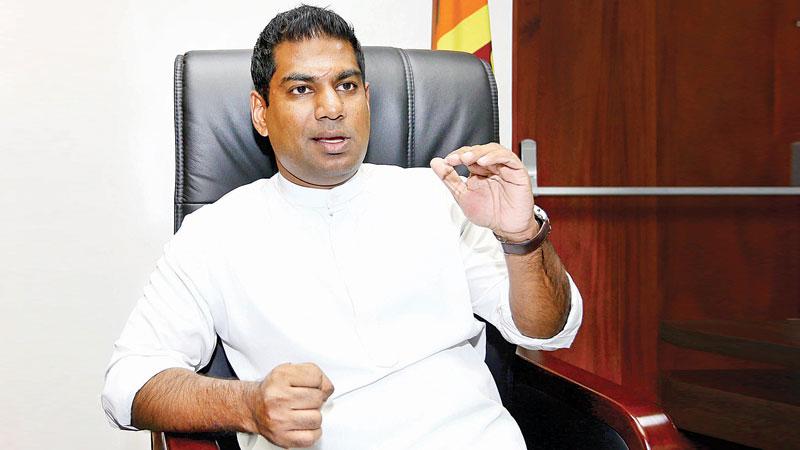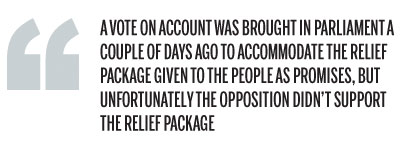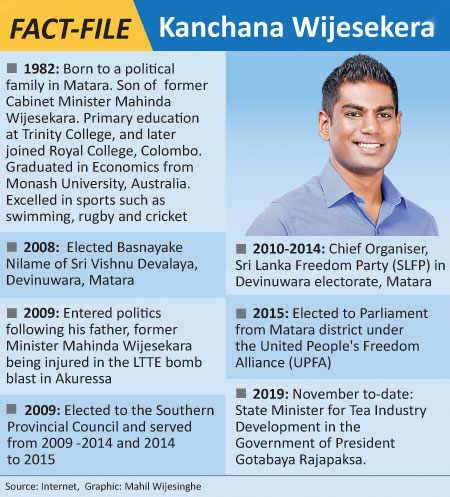
State Minister of Tea Industry Development Kanchana Wijesekera said the people would decide who should represent the next Parliament whether they should be professionals, non-professionals or politicians. He said the UNP would not secure even 70 seats in Parliament at the upcoming General Election as there was no reason for the people to put their faith back in the UNP.
The State Minister in an interview with the Sunday Observer said there are clear divisions within the UNP which won’t be able to secure the number of votes they received at the last Presidential Election given the popularity of President Gotabaya Rajapaksa. State Minister Wijesekara said there is no formidable political opponent. President Rajapaksa’s coalition led by Prime Minister Mahinda Rajapaksa has gained the support of more parties and coalition partners and is looking to get a two-thirds majority in Parliament at the upcoming polls.
Excerpts from the interview:
Q: Are you well equipped to face the forthcoming General Election against your formidable political rivals?
A: We don’t see a formidable opponent. During the Presidential Elections, they had a much better platform. Sajith Premadasa was looked upon as the best option to defeat President Gotabaya Rajapaksa. All the parties that were within the Government supported him. Rishad Bathiudeen, Mano Ganesan, Champika Ranawaka and all those forces were together. What they managed to obtain at the 2019 Presidential Elections was much less than what they got at the 2015 Presidential election and the 2018 Local Government election. There is a split between former Prime Minister Ranil Wickremesinghe’s faction and Opposition Leader Sajith Premadasa’s. I don’t see a formidable opponent. President Rajapaksa’s coalition led by Prime Minister Mahinda Rajapaksa has gained the support of more parties and coalition partners. We are looking to get a two-thirds majority in Parliament at the upcoming election.
Q: The Opposition capitalises on high commodity prices, failure to pass the benefit of reduced taxes to consumers and the Government not doing enough for the people. How valid are these allegations?
 A: You can’t expect tax benefits or any other benefit by the Government passing to the consumers overnight. We have to consider the fact that even though those benefits have been given, there is no proper budgetary allocation to go with the proposals. A Vote on Account was brought in Parliament a couple of days ago to accommodate the relief package given to the people as promises, but unfortunately the Opposition didn’t support the relief package. We took over the Government in November 18 last year and the Prime Minister assumed office on November 20.
A: You can’t expect tax benefits or any other benefit by the Government passing to the consumers overnight. We have to consider the fact that even though those benefits have been given, there is no proper budgetary allocation to go with the proposals. A Vote on Account was brought in Parliament a couple of days ago to accommodate the relief package given to the people as promises, but unfortunately the Opposition didn’t support the relief package. We took over the Government in November 18 last year and the Prime Minister assumed office on November 20.
However, the cost of living in terms of commodity prices and the prices of other goods was beyond the control of the Government. This had been going on for a period of time. The previous Government didn’t plan well enough to meet the needs or demands of the people in December and January and production shrank as a result. They had not settled bills on certain quarters. Those were the problems that we faced in the first couple of months. Now, we manage it in a certain way. I don’t think we will have those problems in the future.
Q: How is it that the TNA welcomes the American travel ban on the Army Commander, but they supported former Army Commander Sarath Fonseka as Presidential Candidate?
A: That is also something new because if Army Commander Shavendra Silva was supporting the UNP, the TNA would have opposed any move backed by the US or any other country. Since Shavendra Silva was not supportive of the UNP or their coalition, they see him as an enemy. Sarath Fonseka during the war was also seen as an enemy by the TNA. Until he became the Presidential Candidate in 2010, allegations were levelled against him. Now, the TNA is saying Sarath Fonseka is not the person who took decisions. They are levelling the same allegations against Army Commander Shavendra Silva. They didn’t level allegations against former Army Commander Mahesh Senanayake. These are just political matters.
The TNA is trying to win the Northern and Eastern Tamil votes by creating a similar picture made during the 30-year separatist war. That is the only way that they can try to get a reasonable number of seats in Parliament. We have seen in the past five years, especially at the last Local Government election as to how the TNA’s popularity has decreased. I don’t think the TNA will have a chance of getting at the next election, even seats that they secured at the 2015 General election. These are just political tricks that are being played. Of course, the TNA will always side with the US and the European countries which bring any resolution against our country.
 Q: Do you expect international repercussions on the Government’s decision to withdraw from the co-sponsorship of the 30/1 Resolution?
Q: Do you expect international repercussions on the Government’s decision to withdraw from the co-sponsorship of the 30/1 Resolution?
A: I don’t think we should expect such things. The Resolution 30/1 was co-sponsored under the US patronage. The US is no longer a part of the UNHRC. About 18 months ago, the US withdrew from the UNHRC when the latter started investigating the former on certain incidents in Iraq. If the US is not a member of the UNHRC, why should we co-sponsor something that is against us? I think we have made the right choice.
Q: How is it that Sri Lanka has been singled out for alleged war crimes, human rights violations when such things happen in large scale in Iraq, Afghanistan, Libya and Syria?
A: When the UNHRC sought investigations on the US, they clearly stated that they were not going to allow any investigator into their country. They said they would not allow anyone of their Armed Forces to be probe into. That was their policy. They said they fought against terrorism and not against anything else.
The Sri Lanka Army also fought against terrorism. Even the US banned the LTTE as one of the key terrorist organisations in the world. Former Indian Prime Minister Rajiv Gandhi was also assassinated by the LTTE. The LTTE was not just another terrorist group - they had their own Air Force, Navy, Police and the Judiciary.
They were a banned terrorist organisation. Sri Lanka’s security forces fought against them. During a war, there are casualties on both sides. Such things are a part of the war.
If we are to investigate everything that took place during the war against terrorism, we should compensate for soldiers who lost their limbs and sacrificed their lives and the people who lost their lives and assets. They should also be compensated and not just the LTTE cadres alone.
Q: Some SLPP frontliners are against former President Maithripala Sirisena being appointed as the chairman of the political alliance formed between the SLPP and SLFP. Don’t you think that these confrontations are unhealthy to the SLPP-SLFP unity in fighting the forthcoming election?
A: The SLPP is a separate party, but the Sri Lanka Freedom Podujana Alliance formed with the SLFP and other affiliated parties, decided on positions. The leadership of the alliance was given to SLPP leader, Prime Minister Mahinda Rajapaksa and the SLFP was given an opportunity to name the chairman of the alliance. The nomination for the chairmanship of the alliance was made by the SLFP. I know that there is a lot of criticism, and I also have the same criticism not about the SLFP or its members, but how the SLFP leader behaved in the past five years up to the previous election. The alliance leader is Prime Minister Mahinda Rajapaksa, General Secretary is Basil Rajapaksa and more than half of the stake is within the SLPP. The decision making process will be by Prime Minister Rajapaksa and the SLPP group and not by former President Sirisena.
Q: The UNP is optimistic that they can form a Government next time. Do you think with infighting, political cut-throats and leadership crisis, will the people vote them to power?
A: If you go back to the Presidential Election results and what we have seen in Sri Lanka’s history, every time when a new President was elected and the parliamentary elections held after that, the majority was always won by the coalition backed by the President. Considering the results of the last Presidential election, the UNP will not gain even 70 seats in Parliament at the upcoming General Election. During the past three months, there was no reason for the people to put their faith back in the UNP. There are divisions within the UNP. With divisions within the UNP and the popularity of President Rajapaksa, the UNP will not get at the upcoming General Elections the number of seats they secured at the last Presidential Election. Rather than forming a Government, the UNP’s biggest battle would be to keep the number of seats they secured at the last Presidential Election. If they can get 50 seats, it will be a great achievement.
Q: What are your views on the 19th Amendment? Many people hold the view that rather than doing away with it, areas not conducive to good governance should be deleted to make it more meaningful?
A: The 19th Amendment was brought in a hurry to Parliament by the previous Government with the sole purpose of preventing the then Opposition members, Rajapaksa family members and others whom they thought were a threat to them from contesting future elections. We don’t have a problem of making certain institutions independent. But we have to see whether those institutions have been made independent. After the Bribery Commission was made independent, its Director General was appointed by former Prime Minister Ranil Wickremesinghe. Even from the video tapes and voice recordings that came out to the public during the past two to three months, we saw how influential they were in putting pressure on Opposition members. I don’t think any of those bodies acted independently.
We could see how the then Police chief behaved. We saw after the appointment of the Independent Election Commission, even the Chairman of the Election Commission didn’t have the authority to hold the Local Government elections or the Provincial Council elections on time.
We should overcome those obstacles. There are certain beneficial features in the 19th Amendment. The Right to Information Act is something that we can accommodate. It is better to bring a new Constitution which will cater to the electoral needs, Election Commission needs and other requirements.
Q: The culprits of the Easter Sunday bombings have not been identified and prosecuted. In the Bond Scam, those responsible have not been prosecuted. Could you give an undertaking that the culprits of both cases will be brought to book during the tenure of the SLPP Government?
A: Definitely, we will do that. We will exert pressure on the Government and the officials to take measures needed to bring them to courts. But we are not going to put political pressure on any of these investigations. These have to be independent investigations, but what we have seen in both instances, the previous Government gave a security blanket to those who were accused of wrongdoings.
There were certain things that were uncovered during Parliamentary proceedings and the Commissions uncovered a lot of things which paved the way for the main culprits to leave the country. Even in the Easter Sunday bombings, the main political leaders who were responsible passed the ball to the Police Chief and the Defence Secretary. Now, the investigations are moving forward. We hope by the end of the year, the people will see justice meted out in the bond scam and the Easter Sunday bombing cases.
Q: How valid is the argument that professionals and academics in place of rogue politicians, should be voted to the Legislature to ensure good governance?
A: Even now, there are professionals in Parliament. The people need to choose wisely. I am not saying that the entire Parliament should be made up of professionals. There are professionals in this Parliament and were in the previous one. But we have to take into account what sort of contribution they have made. Newcomers are most welcome.
But we have to see whether they are doing the job that they are assigned to do and whether they are taking care of the needs of the people. There should be professionals and others from the grassroots level. Those in different sectors should represent Parliament.
The people will decide who should represent the next Parliament whether they should be professionals, non-professionals or politicians.
